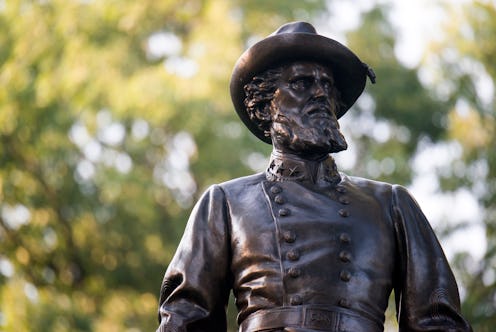News
Stonewall Jackson's Relatives Wrote An Open Letter On Confederate Statues & Here Are Its 8 Most Powerful Lines

The violent clashes in Charlottesville, VA., this weekend between white nationalists protesting the removal of Confederate Gen. Robert E. Lee's statue and counter-protestors have sparked fierce debate about other Confederate monuments throughout the country. Elected officials like the mayor of Baltimore have decided to remove such monuments from public places because of their association with slavery in the south. Others, however, are still considering whether to act. In an open letter Wednesday, two of Stonewall Jackson's descendants called for his Confederate statue's removal in Richmond, VA., where they live.
Thomas "Stonewall" Jackson was a Confederate general during the Civil War. Richmond is a former Confederate capital and home to Monument Ave., a five-mile street where monuments stand at intersections and traffic circles. Back in June, as calls to remove Confederate statues echoed throughout the country, Richmond Mayor Levar Stoney said he would not seek to remove Confederate statues on Monument Ave., but rather announced plans to add context to the statues and educate Virginia residents as well as visitors about their place in history.
Jackson's great, great grandsons, Jack Christian and Warren Christian penned a letter, published by Slate, to Stoney and the members of the Monument Ave. Commission to make their case for removing not only Jackson's, but also all other Confederate statues from the area.
As of Thursday, Richmond's statues remain standing, and Jackson's great, great grandsons make some great points in their letter toward removing not just his statue, but others as well.
1. "They are overt symbols of racism and white supremacy."
"They are overt symbols of racism and white supremacy," the Christian brothers wrote, "and the time is long overdue for them to depart from public display."
2. "His statue does not represent us."
"We are writing to say that we understand justice very differently from our grandfather’s grandfather, and we wish to make it clear his statue does not represent us."
3. "We cannot ignore his decision to own slaves."
"We have learned how thoughtful and loving he was toward his family. But we cannot ignore his decision to own slaves, his decision to go to war for the Confederacy, and, ultimately, the fact that he was a white man fighting on the side of white supremacy."
4. "We are ashamed of the monument."
"While we are not ashamed of our great-great grandfather, we are ashamed to benefit from white supremacy while our black family and friends suffer. We are ashamed of the monument."
5. "We choose to celebrate Stonewall’s sister — our great-great, grand-aunt —Laura Jackson Arnold."
"...We choose to celebrate Stonewall’s sister — our great-great, grand-aunt —Laura Jackson Arnold. As an adult Laura became a staunch Unionist and abolitionist. Though she and Stonewall were incredibly close through childhood, she never spoke to Stonewall after his decision to support the Confederacy."
6. "In the 1870s, John Mitchell, a black city councilman, called the monuments a tribute to 'blood and treason.'"
"In the 1870s, John Mitchell, a black city councilman, called the monuments a tribute to 'blood and treason' and voiced strong opposition to the use of public funds for building them."
7. "These monuments do not stand somehow outside of history."
"Ongoing racial disparities in incarceration, educational attainment, police brutality, hiring practices, access to health care, and, perhaps most starkly, wealth, make it clear that these monuments do not stand somehow outside of history."
8. "We are in need of a new context — one in which the statues have been taken down."
"As cities all over the South are realizing now, we are not in need of added context. We are in need of a new context — one in which the statues have been taken down."
On Wednesday, Richmond Mayor Stoney announced that the Commission would examine options to either remove or relocate Confederate statues from the area. Although he originally advocated for providing context for the monuments, he cited the events in Charlottesville as something that "may have fundamentally changed our ability to do so by revealing their power to serve as a rallying point for division and intolerance and violence."